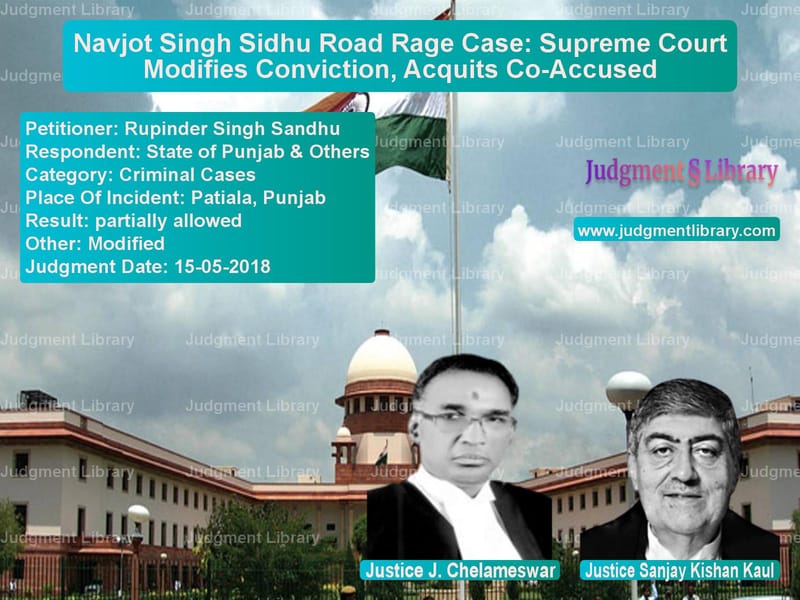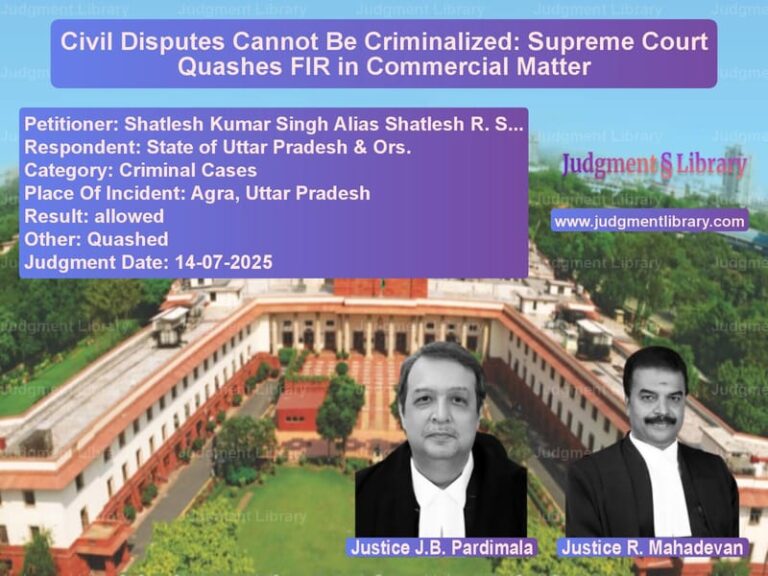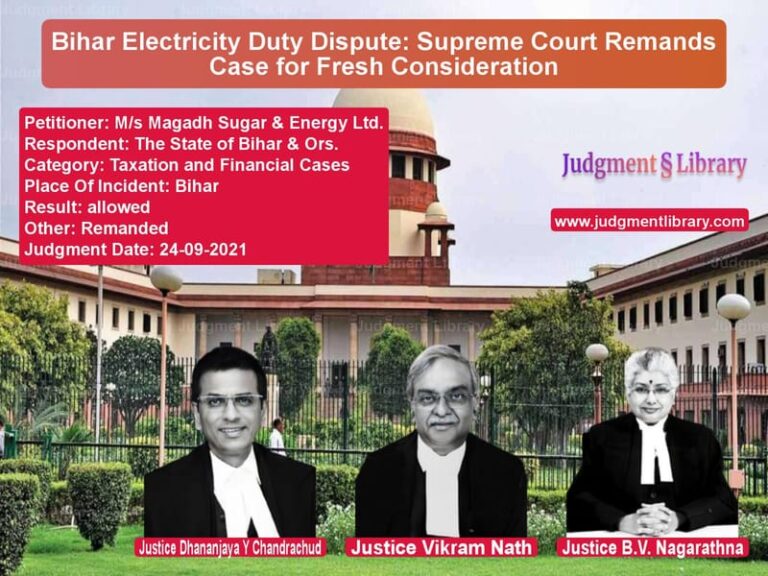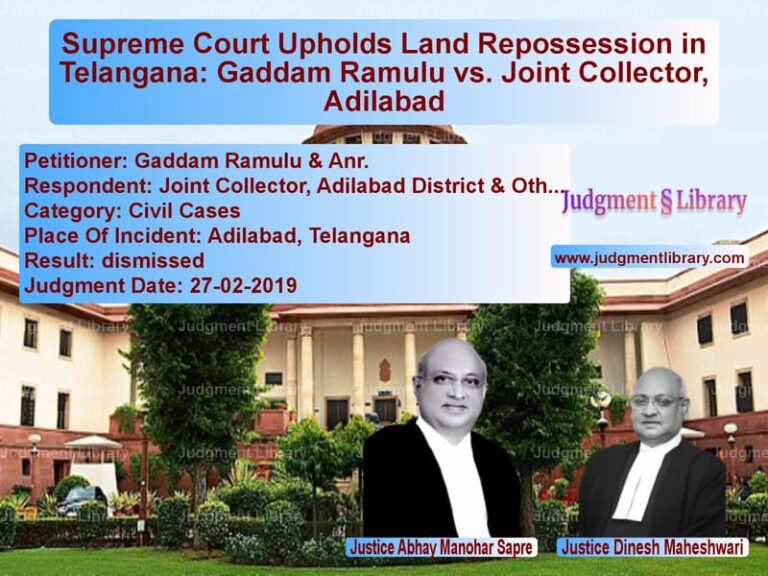Navjot Singh Sidhu Road Rage Case: Supreme Court Modifies Conviction, Acquits Co-Accused
The case of Rupinder Singh Sandhu v. State of Punjab & Others pertains to the infamous road rage incident involving former cricketer and politician Navjot Singh Sidhu. The Supreme Court delivered a judgment that overturned his conviction for culpable homicide and instead convicted him under Section 323 IPC (voluntarily causing hurt), imposing a fine of Rs. 1,000. The co-accused, Rupinder Singh Sandhu, was acquitted.
This case, dating back to December 27, 1988, has been widely followed due to its high-profile nature and the legal complexities surrounding culpable homicide. The Supreme Court’s final ruling analyzed medical evidence, witness testimonies, and procedural errors to arrive at a judgment that has far-reaching legal implications.
Chronology of the Incident
The case originates from an incident at Battian Wala Chowk, Patiala, on December 27, 1988, which led to the death of Gurnam Singh. According to the prosecution:
- At approximately 12:30 PM, the deceased, Gurnam Singh, was driving a Maruti car with two companions, Jaswinder Singh (PW3) and Avtar Singh (PW4).
- They were involved in a dispute over the right of way with a Gypsy driven by the accused, Navjot Singh Sidhu (A1), with Rupinder Singh Sandhu (A2) as a passenger.
- Sidhu got out of his vehicle, pulled Gurnam Singh out of his car, and struck him with his fists.
- Rupinder Singh Sandhu also exited the Gypsy and allegedly assaulted Jaswinder Singh (PW3).
- After the altercation, the accused took the car keys of the deceased and left the scene.
Following the incident, Gurnam Singh was taken to Rajendra Hospital by rickshaw but was declared dead on arrival.
Legal Proceedings and Charges
The prosecution charged the accused under Sections 304 Part II IPC (culpable homicide not amounting to murder) and Section 34 IPC (common intention). The case underwent multiple stages of litigation:
- Sessions Court: Acquitted both accused due to lack of evidence proving causation of death.
- High Court: Reversed the acquittal, convicting Sidhu under Section 304 Part II IPC and Sandhu under Section 304 Part II IPC read with Section 34 IPC.
- Supreme Court: Partially overturned the High Court’s ruling, convicting Sidhu under Section 323 IPC and acquitting Sandhu.
Prosecution’s Case
The prosecution relied on eyewitness accounts and medical reports, arguing that:
- The accused assaulted the deceased, leading to fatal injuries.
- Jaswinder Singh (PW3) and Avtar Singh (PW4) provided direct evidence of the altercation.
- Medical reports indicated a subdural hemorrhage, which the prosecution attributed to Sidhu’s fist blows.
Defense Arguments
The defense countered by arguing:
- The medical evidence was inconclusive regarding the cause of death.
- The prosecution failed to prove intent necessary for culpable homicide.
- There were inconsistencies in witness testimonies.
Medical Evidence and Judicial Analysis
The post-mortem report noted:
- An abrasion on the left temporal region and another on the left knee.
- Subdural hemorrhage present on the left temporal region.
- The pathologist found no significant brain injury but noted cardiac abnormalities.
The forensic board’s final opinion stated:
“Death in this case is attributed to the effects of head injury and cardiac condition. However, the head injury in itself could be sufficient to cause death in the ordinary course of nature.”
The Supreme Court, after reviewing the medical evidence, held that:
- The prosecution failed to prove that the injuries directly led to the death.
- The presence of pre-existing cardiac conditions introduced reasonable doubt.
- There was no clear evidence of intent to cause grievous bodily harm.
Supreme Court’s Final Judgment
The Supreme Court ruled:
- Navjot Singh Sidhu was guilty of voluntarily causing hurt under Section 323 IPC and was fined Rs. 1,000.
- Rupinder Singh Sandhu was acquitted due to lack of evidence linking him to the crime.
The Court held:
“The law does not convict individuals based on doubt. The prosecution must establish guilt beyond reasonable doubt.”
Legal Precedents and Implications
This ruling reinforces key legal principles:
- Burden of Proof: The prosecution must establish clear causation between injury and death.
- Medical Evidence: Courts require unambiguous forensic reports to support homicide charges.
- Judicial Review: Appellate courts must base reversals on substantial errors of law and fact.
Conclusion
The Supreme Court’s ruling in this case underscores the importance of medical evidence and the high threshold for proving culpable homicide. While Sidhu was held accountable for his actions, the Court found that the prosecution had failed to establish a direct link between his actions and Gurnam Singh’s death.
This judgment serves as a critical reference for cases involving unintended fatal consequences in physical altercations.
Petitioner Name: Rupinder Singh Sandhu.Respondent Name: State of Punjab & Others.Judgment By: Justice J. Chelameswar, Justice Sanjay Kishan Kaul.Place Of Incident: Patiala, Punjab.Judgment Date: 15-05-2018.
Don’t miss out on the full details! Download the complete judgment in PDF format below and gain valuable insights instantly!
Download Judgment: Rupinder Singh Sandh vs State of Punjab & Ot Supreme Court of India Judgment Dated 15-05-2018.pdf
Direct Downlaod Judgment: Direct downlaod this Judgment
See all petitions in Murder Cases
See all petitions in Attempt to Murder Cases
See all petitions in Judgment by J. Chelameswar
See all petitions in Judgment by Sanjay Kishan Kaul
See all petitions in partially allowed
See all petitions in Modified
See all petitions in supreme court of India judgments May 2018
See all petitions in 2018 judgments
See all posts in Criminal Cases Category
See all allowed petitions in Criminal Cases Category
See all Dismissed petitions in Criminal Cases Category
See all partially allowed petitions in Criminal Cases Category







